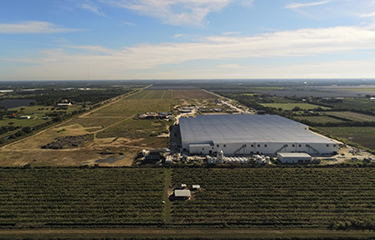In the wake of Atlantic Sapphire’s revised revenue expectations on Sunday, 16 October – which caused the company’s share price to plummet to its lowest level ever – the company is now reportedly expecting delays in its phase-two developments.
Atlantic Sapphire revised its revenue expectations downward and reported more salmon mortalities at the company’s recirculating aquaculture system (RAS) farm in Miami, Florida, U.S.A.. The news of decreased revenue – and yet more mortalities at the company which has seen at least one mass mortality event a year since 2020, caused the share price to plummet to its lowest-ever level.
However, reports that the company has halted its construction in the wake of the news are inaccurate, Atlantic Sapphire Chief Sales and Marketing Officer Damien Claire told SeafoodSource.
"We have not been forced to pause construction due to the recent challenges,” Claire said.
Atlantic Sapphire CFO Karl Øystein Øyehaug told Dagens Naeringsliv the company “must achieve EBITDA [earnings before interest, taxes, depreciation, and amortization] break-even” before it can draw on the debt earmarked for phase two.
“We will not invest significantly in phase two before we have succeeded in this,” he said, adding that the phase two development will be delayed, potentially for months.
Claire clarified that the company always planned to wait until phase one was successful before starting on the "most capex-intensive parts" of phase 2 construction.
“We’ve always been clear that we first want to reach EBITDA break-even in phase one before we start with the most capex-intensive parts of the phase two construction,” he said. “That is still the case.”
He added that the cause of the mortalities is still under investigation.
As of 19 October, the company's share price stood at NOK 5.15 (USD 0.48, EUR 0.49), and the company had a market cap of NOK 789 million (USD 74 million, EUR 75 million) according to the Euronext Oslo Børs, far below its peak in February 2021, when its stock was valued at over NOK 140 (USD 13.16, EUR 13.48).
The company hasn’t posted a break-even EBITDA since it began selling its salmon, and it reported a loss on its EBIT for H1 2022 of USD 12.3 million (EUR 12.5 million), and its EBITDA stood at a loss of USD 5.7 million (EUR 5.8 million). During its H1 report Atlantic Sapphire reported a “strengthened balance sheet” and completed financing of the phase two expansion through a USD 125 million (EUR 127 million) private placement, and an additional USD 98 million (EUR 100 million) from a term debt credit that was approved by DNB. That funding is conditional on the EBITDA breaking-even, Øyehaug said. The company previously had a requirement involving its net interest bearing debt to EBIDTA, but the requirement was given a formal waiver from lenders on 21 June, 2022, according to Atlantic Sapphire's H1 2022 report.
The phase two development budget is estimated at between USD 275 million and USD 300 million (EUR 281 million and EUR 306 million).
Photo courtesy of Atlantic Sapphire







